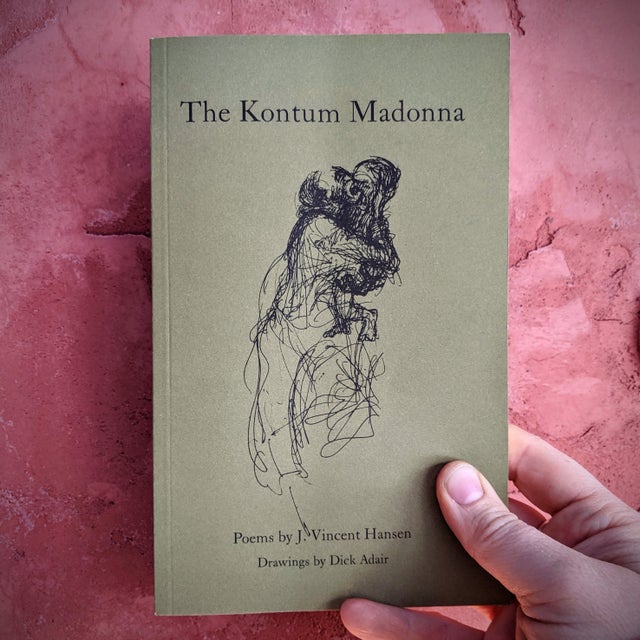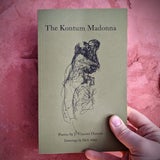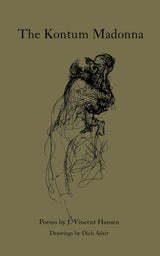- Bookstore
- >
- Non-Fiction
- >
- The Kontum Madonna
The Kontum Madonna
SKU:
$15.00
$15.00
Unavailable
per item
By J. Vincent Hansen
Illustrations by Dick Adair
50 years after the war Hansen continues to mine his time in Vietnam as an 18-year-old machine gunner with the 101st Airborne Division. These poems inform us that no soldier ever grows so old as to see a war's final ripple.
J. Vincent Hansen grew up on a farm near Sauk Rapids, Minnesota. After high school, he spent three years in the Army followed by seven years working in East Africa as an agricultural volunteer with the Maryknoll Fathers. He is the recipient of the 1990 Loft-McKnight Award for Poetry, and a 2009 Bush Artist Fellowship in Poetry. He is the author of the books Blessed Are the Piecemakers, Without Dividend in Mind, The Medicine of Place, and a multi-media play, The Wedding of Tomorrow and Sorrow. He lives with his wife, Jeanette, in Sauk Rapids, Minnesota.
Dick Adair (1935-2018) was a Navy journalist and war correspondent for the military newspaper Stars and Stripes and also the author of the book Saigon published by Weatherhill in 1971. Later in life his art brought him many awards while working as a cartoonist in Honolulu, Hawaii.
Illustrations by Dick Adair
50 years after the war Hansen continues to mine his time in Vietnam as an 18-year-old machine gunner with the 101st Airborne Division. These poems inform us that no soldier ever grows so old as to see a war's final ripple.
J. Vincent Hansen grew up on a farm near Sauk Rapids, Minnesota. After high school, he spent three years in the Army followed by seven years working in East Africa as an agricultural volunteer with the Maryknoll Fathers. He is the recipient of the 1990 Loft-McKnight Award for Poetry, and a 2009 Bush Artist Fellowship in Poetry. He is the author of the books Blessed Are the Piecemakers, Without Dividend in Mind, The Medicine of Place, and a multi-media play, The Wedding of Tomorrow and Sorrow. He lives with his wife, Jeanette, in Sauk Rapids, Minnesota.
Dick Adair (1935-2018) was a Navy journalist and war correspondent for the military newspaper Stars and Stripes and also the author of the book Saigon published by Weatherhill in 1971. Later in life his art brought him many awards while working as a cartoonist in Honolulu, Hawaii.
"Reading Jerry Hansen's poems in The Kontum Madonna is like standing in front of the black granite Viet Nam memorial in Washington, D.C., and reading the names of the men and women who died in the war. Hansen names and mourns his comrades, but the difference is that his poems also make us see the Vietnamese people, both soldiers and civilians, men, women, and children, who died in that almost-forgotten war. But Hansen was there, and he can't forget the awful realization of kinship: with the little boys, blown wide open on their way to school, or the old farmer whose animals and crops and seeds he and other Minnesota farm boys destroyed, or The Kontum Madonna, "a woman and her child soldered together" in a bombed-out field.
In these poems Hansen refuses to take comfort in the familiar cliches we use--Myths and Illusions, he calls them--to make war less terrible than it is. He has dedicated this collection to his friend Pappy, who died in Vietnam. But he resists making his friend's death heroic or his poem a patriotic eulogy. He writes instead:
If I let them say
that you were brave,
that what we did was good,
they will use
their memory of you
to kill again and again.
These poems are stark, the rhythms jagged, almost like the line drawings by Dick Adair that accompany them. The images are unsparing and unforgettable: the dead, wrapped in ponchos, and lying side by side "like giant cucumbers/ in a great garden," or little boys, "spread thin, like strawberry jam/ onto a slice of Asian meadow."
The Vietnam war takes up a page, if that, in most U.S. history textbooks. But Hansen's poems refuse the comfort of forgetting or the illusion of a return to innocence. If we look carefully between the lines and among the images, we, as readers, may see our own faces among the dead, as we do when we stand in front of that polished black wall in Washington.
I highly recommend The Kontum Madonna for its courage and harsh beauty, its compassion, and its unflinching resistance to war--all war."
-Mara Faulkner, OSB
Professor Emerita of English, College of St. Benedict/St. John's University Author of Going Blind: A Memoir and Still Birth, a poetry chapbook.
In these poems Hansen refuses to take comfort in the familiar cliches we use--Myths and Illusions, he calls them--to make war less terrible than it is. He has dedicated this collection to his friend Pappy, who died in Vietnam. But he resists making his friend's death heroic or his poem a patriotic eulogy. He writes instead:
If I let them say
that you were brave,
that what we did was good,
they will use
their memory of you
to kill again and again.
These poems are stark, the rhythms jagged, almost like the line drawings by Dick Adair that accompany them. The images are unsparing and unforgettable: the dead, wrapped in ponchos, and lying side by side "like giant cucumbers/ in a great garden," or little boys, "spread thin, like strawberry jam/ onto a slice of Asian meadow."
The Vietnam war takes up a page, if that, in most U.S. history textbooks. But Hansen's poems refuse the comfort of forgetting or the illusion of a return to innocence. If we look carefully between the lines and among the images, we, as readers, may see our own faces among the dead, as we do when we stand in front of that polished black wall in Washington.
I highly recommend The Kontum Madonna for its courage and harsh beauty, its compassion, and its unflinching resistance to war--all war."
-Mara Faulkner, OSB
Professor Emerita of English, College of St. Benedict/St. John's University Author of Going Blind: A Memoir and Still Birth, a poetry chapbook.



